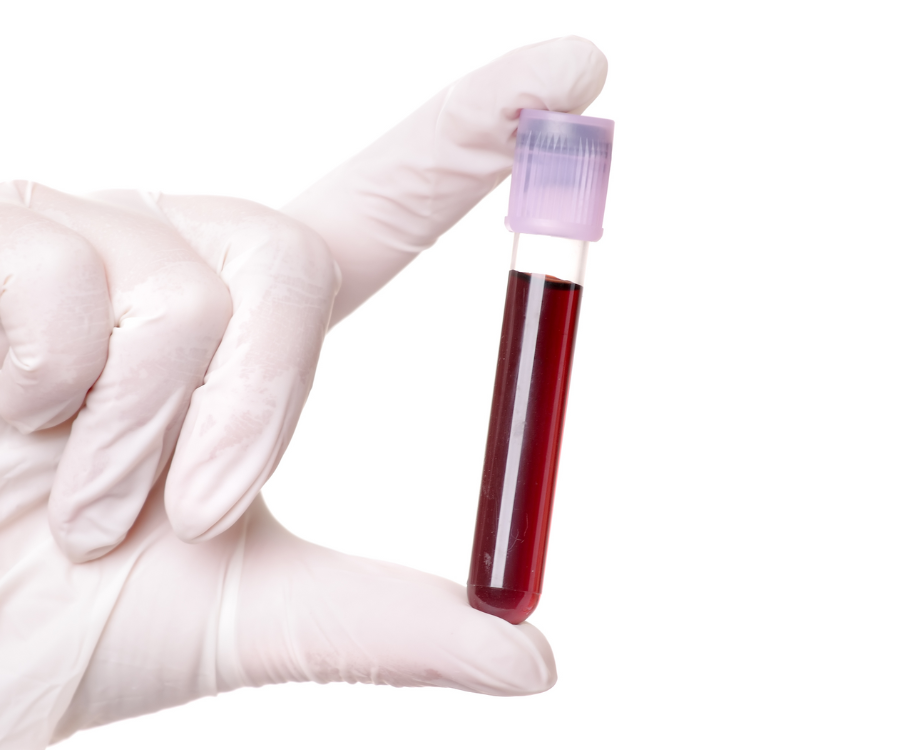Getting blood drawn may not look like self-care, but it’s the best things I do for my health on a regular basis.
Five years ago, my body looked like the picture of optimal health, but the reality was I didn’t feel healthy from within. I was completely burned out and exhausted.
As moms, we have a habit of pushing through our days and not checking in on our own health. I was guilty of this after becoming a new mom, but I always blamed it on managing my business while also taking care of my family.
When I decided to get blood work drawn to see what was going on with my health, here’s what my initial labs showed:
-
Adrenal insufficiency
-
Underactive thyroid
-
Extremely low estrogen
I was suffering from chronic stress and fatigue from taking on too much at once. These results shifted my mindset to practice more self-care, set boundaries and start making sleep a priority.
Many doctors had looked at my blood work and said I looked “perfect” compared to normal standards. However, we need doctors and other health care professionals to dive deeper into our results and compare what they find to optimal health.
When clients come to us about continued uncomfortable systems, we always recommend getting blood work done to check for any underlying issues.
When a client tells us they feel great- we STILL recommend getting blood work done. Here’s an example why:
Our head of nutrition, Erin Parekh does an exceptional job at eating clean and taking care of her mind and body, but after routine blood work after having a baby, she was diagnosed with a thyroid disorder- postpartum thyroiditis. . Luckily, she caught it early and had no symptoms.
Unfortunately, many people develop disease and are diagnosed after their uncomfortable symptoms kick in.
WHY SWW RECOMMENDS ROUTINE BLOOD WORK
-
Serves as a baseline to measure your health
-
Ability to catch illness/diseases early
-
Measures your body's chemical balance and metabolism
-
Determines how your body processes glucose
-
Properly balances your hormones
Depending on your age and health history, blood work should be scheduled once a year, if not twice or even more if you have an ongoing condition that needs monitoring.
Here are some questions to ask your doctor about blood work:
-
If you have family history of a specific disease, what is it and how to test?
-
For life altering experiences in the past year (surgery, severe injury, mental/physical trauma, childbirth), what specific blood tests should you have done?
-
How to read your blood test results and understand what is normal and abnormal
-
Based on your blood test results, do you need medication or can the issue resolve through diet and lifestyle changes
In addition to speaking with your doctor, we also recommend working with a functional doctor or nutritionist to help read between the lines of your blood work. When something says “normal range” it isn’t necessarily optimal. For example, B12 values might be within range, but if it’s on the lower end we can still supplement to help increase energy and metabolism.
SWW RECOMMENDED BLOOD TESTS
- COMPLETE BLOOD COUNT (CBC)/ HEMATOLOGY- checks your blood for signs of infection, immune system problems, bleeding problems, and anemia (low iron).
- METABOLIC PANEL- shares how your kidneys and liver are functioning and tests your levels of chemicals such as blood sugar, calcium, sodium, and protein.
- LIVER FUNCTION- measure different enzymes, proteins, and other substances made by the liver.
- THYROID PANEL (TSH, total T3, free T3, total T4, free T4, TPO, Thyroglobulin)- measuring how your thyroid is functioning.
- C-REACTIVE PROTEIN- detects inflammation in the body.
- TRANSFERRIN- the amount of iron in the body.
- VITAMIN D- screens for low levels of Vitamin D in the blood.
- B12- detects level of hemoglobin (a substance that transports oxygen) and whether your red blood cells are larger than normal.
- GLUCOSE UPTAKE (glucose, insulin, hbA1C)- quantifies the cell biological response to insulin stimulation to detect sensitivity or resistance.
- BLOOD CHEMISTRY PANEl- provides status on your muscles, bones, heart, and other organs. It also checks your blood sugar, calcium, and other minerals.
- BLOOD ENZYME TESTS- used to check for potential risk of heart attack.
- LIPOPROTEIN PANEL- measures the levels of LDL and HDL cholesterol and triglycerides in your blood.
- BLOOD CLOTTING TESTS- also called a coagulation panel. These tests check proteins in your blood that affect the blood clotting process.
Most doctors will not run all of these tests at an annual physical. It is important to ask for them and then have someone with the right knowledge such as an SWW coach to review.
Getting ahead of any illness brewing in the body is the best way to lower your risk of serious health issues down the road.
REFERENCES:
“Blood Tests” National Lung, Heart and Blood Institute. https://www.nhlbi.nih.gov/health/blood-tests



